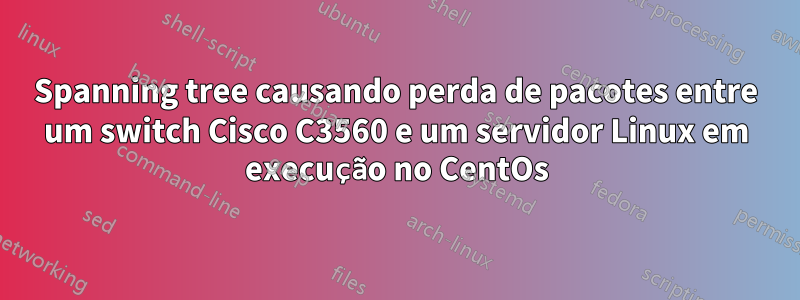
Estou trabalhando em um ambiente de rede onde tenho alguns servidores Cisco Switch WS-C3560X-48 e Linux executando CentOS 7.7.
Os servidores Linux estão conectados 3 vezes em meus switches: um link de administrador, um link de produção e um link ILO porque estão rodando em hardware HP.
Quando tento fazer ping nos servidores na LAN administrativa do meu switch Cisco, obtenho o seguinte resultado:
SWTCisco#ping 10.123.213.152 source 10.123.213.158 repeat 100
Type escape sequence to abort.
Sending 100, 100-byte ICMP Echos to 10.123.213.152, timeout is 2 seconds:
Packet sent with a source address of 10.123.213.158
!!!!!!.!!!!!!.!!!!!!.!!!!!!.!!!!!!.!!!!!!.!!!!!!.!!!!!!.!!!!!!.!!!!!!.
!!!!!!.!!!!!!.!!!!!!.!!!!!!.!!
Success rate is 86 percent (86/100), round-trip min/avg/max = 1/3/17 ms
Como você pode ver, tenho um padrão, sempre perco um pacote no 7º ping. No lado do servidor, posso ver com o tcpdump que a solicitação icmp foi recebida, mas a resposta icmp não foi enviada. No exemplo abaixo, pinguei 8 vezes o servidor e podemos ver 2 solicitações uma após a outra.
root@CentOSserver:/etc/sysconfig/network-scripts# tcpdump -i eno1 host 10.123.213.158 -nn
tcpdump: verbose output suppressed, use -v or -vv for full protocol decode
listening on eno1, link-type EN10MB (Ethernet), capture size 262144 bytes
11:37:04.770292 IP 10.123.213.158 > 10.123.213.152: ICMP echo request, id 134, seq 0, length 80
11:37:04.770354 IP 10.123.213.152 > 10.123.213.158: ICMP echo reply, id 134, seq 0, length 80
11:37:04.772624 IP 10.123.213.158 > 10.123.213.152: ICMP echo request, id 134, seq 1, length 80
11:37:04.772644 IP 10.123.213.152 > 10.123.213.158: ICMP echo reply, id 134, seq 1, length 80
11:37:04.774394 IP 10.123.213.158 > 10.123.213.152: ICMP echo request, id 134, seq 2, length 80
11:37:04.774411 IP 10.123.213.152 > 10.123.213.158: ICMP echo reply, id 134, seq 2, length 80
11:37:04.776592 IP 10.123.213.158 > 10.123.213.152: ICMP echo request, id 134, seq 3, length 80
11:37:04.776606 IP 10.123.213.152 > 10.123.213.158: ICMP echo reply, id 134, seq 3, length 80
11:37:04.789083 IP 10.123.213.158 > 10.123.213.152: ICMP echo request, id 134, seq 4, length 80
11:37:04.789099 IP 10.123.213.152 > 10.123.213.158: ICMP echo reply, id 134, seq 4, length 80
11:37:04.791466 IP 10.123.213.158 > 10.123.213.152: ICMP echo request, id 134, seq 5, length 80
11:37:04.791483 IP 10.123.213.152 > 10.123.213.158: ICMP echo reply, id 134, seq 5, length 80
11:37:04.793669 IP 10.123.213.158 > 10.123.213.152: ICMP echo request, id 134, seq 6, length 80
11:37:04.822159 ARP, Request who-has 10.123.213.158 tell 10.123.213.144, length 46
11:37:06.793024 IP 10.123.213.158 > 10.123.213.152: ICMP echo request, id 134, seq 7, length 80
11:37:06.793068 IP 10.123.213.152 > 10.123.213.158: ICMP echo reply, id 134, seq 7, length 80
10.123.213.158 é o endereço da vlan no meu switch Cisco
10.123.213.152 é o endereço do eno1 no servidor Linux
10.123.213.144 é o endereço ILO de outro servidor fazendo uma solicitação arp enquanto meu tcpdump estava em execução.
Após nova investigação, descobri que o problema está relacionado à árvore geradora. Hospedei um pcap do que encontrei. https://filebin.net/9x9ech3uude93sda
No pcap, podemos ver que existe um pacote STP entre as 2 solicitações icmp. Tentei várias vezes e todas as vezes, um pacote STP é onde deveria ter encontrado minha resposta.
Para mim, é apenas uma mensagem bpdu e não deve ter nenhum impacto na minha interface GigabitEthernet0/27.
Nada particularmente alarmante (para mim) é visível na configuração da spanning tree no Cisco:
SWTCisco#sh spanning-tree vlan 28
VLAN0028
Spanning tree enabled protocol ieee
Root ID Priority 32796
Address 501c.bf45.1c00
This bridge is the root
Hello Time 2 sec Max Age 20 sec Forward Delay 15 sec
Bridge ID Priority 32796 (priority 32768 sys-id-ext 28)
Address 501c.bf45.1c00
Hello Time 2 sec Max Age 20 sec Forward Delay 15 sec
Aging Time 300 sec
Interface Role Sts Cost Prio.Nbr Type
------------------- ---- --- --------- -------- --------------------------------
Gi0/11 Desg FWD 4 128.11 P2p
Gi0/18 Desg FWD 4 128.18 P2p
Gi0/19 Desg FWD 4 128.19 P2p
Gi0/20 Desg FWD 4 128.20 P2p
Gi0/21 Desg FWD 19 128.21 P2p
Gi0/22 Desg FWD 4 128.22 P2p
Gi0/23 Desg FWD 4 128.23 P2p
Gi0/24 Desg FWD 4 128.24 P2p
Gi0/25 Desg FWD 4 128.25 P2p
Gi0/26 Desg FWD 4 128.26 P2p
Gi0/27 Desg FWD 4 128.27 P2p
Gi0/31 Desg FWD 4 128.31 P2p
Gi0/32 Desg FWD 19 128.32 P2p
Gi0/33 Desg FWD 4 128.33 P2p
Gi0/34 Desg FWD 4 128.34 P2p
Gi0/35 Desg FWD 4 128.35 P2p
Gi0/36 Desg FWD 4 128.36 P2p
Gi0/37 Desg FWD 4 128.37 P2p
Gi0/38 Desg FWD 4 128.38 P2p
Gi0/39 Desg FWD 4 128.39 P2p
Gi0/40 Desg FWD 4 128.40 P2p
Gi0/47 Desg FWD 19 128.47 P2p
Gi1/3 Desg FWD 4 128.51 P2p
SWTCisco#sh run int gigabitEthernet 0/27
Building configuration...
Current configuration : 113 bytes
!
interface GigabitEthernet0/27
switchport access vlan 28
switchport mode access
end
SWTCisco#sh spanning-tree blockedports
Name Blocked Interfaces List
-------------------- ------------------------------------
Number of blocked ports (segments) in the system : 0
SWTCisco#sh spanning-tree summary
Switch is in pvst mode
Root bridge for: VLAN0028, VLAN0031, VLAN3715
EtherChannel misconfig guard is enabled
Extended system ID is enabled
Portfast Default is disabled
PortFast BPDU Guard Default is disabled
Portfast BPDU Filter Default is disabled
Loopguard Default is disabled
UplinkFast is disabled
BackboneFast is disabled
Configured Pathcost method used is short
Name Blocking Listening Learning Forwarding STP Active
---------------------- -------- --------- -------- ---------- ----------
VLAN0028 0 0 0 23 23
VLAN0031 0 0 0 12 12
VLAN0157 0 0 0 1 1
VLAN3715 0 0 0 1 1
---------------------- -------- --------- -------- ---------- ----------
4 vlans 0 0 0 37 37
SWTCisco#sh version | in RELEASE
Cisco IOS Software, C3560E Software (C3560E-UNIVERSALK9-M), Version 12.2(55)SE5, RELEASE SOFTWARE (fc1)
BOOTLDR: C3560E Boot Loader (C3560X-HBOOT-M) Version 12.2(53r)SE1, RELEASE SOFTWARE (fc1)
Observei minha interface Gi0/27 enquanto o ping estava ativo e a interface permanecia no estado FWD.
Alguém tem alguma idéia de por que perco um pacote enquanto o switch está enviando um quadro bdpu? Tenho alguns problemas para entender algumas funcionalidades avançadas do stp, então posso estar faltando alguma coisa aqui.


